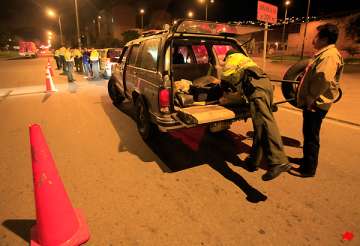Colombian Capital Mayor Bans Gun Wiedling In Public
Bogota, Colombia, Feb 2: Gustavo Petro was imprisoned as a rebel in the 1980s on a weapons conviction. As Bogota's new mayor, he wants to get firearms off the streets of this city where the
Bogota, Colombia, Feb 2: Gustavo Petro was imprisoned as a rebel in the 1980s on a weapons conviction. As Bogota's new mayor, he wants to get firearms off the streets of this city where the conspicuous display of guns has long been the norm.
So he's trying an experimental ban on gun-wielding in public.
The only people authorized to carry weapons during the 90-day trial that began Wednesday are active and retired police and soldiers, bodyguards of diplomats, politicians, judges and prosecutors, armored car guards, gun club members and hunters.
Anyone else caught with a gun will have it seized indefinitely, said the 51-year-old Petro, who took office last month.
“Nobody can walk around armed in the city,” he said Wednesday at a small rally in El Amparo, one of the most dangerous neighborhoods in this city of 8 million people. “I ask the entire citizenry to leave your weapons under mattress.”
Such bans are rare in Latin America: Brazilian civilians have not been permitted to carry arms since 2003, and Venezuela instituted a ban in November on carrying guns on buses and in passenger terminals.
Bogota's ban aims to reduce the murder rate, although experts say that while it may reduce killings triggered by inebriated disputes, they doubt it will discourage criminals.
One of the few young people in the crowd of about 500 attending Wednesday's rally was 24-year-old Lourdes Revero, who said criminals who have their guns confiscated at the checkpoints that Petro's government has set up in key neighborhoods “are smart enough to go get another.”
Handguns can be had for less than $100 in Bogota, according to the mayor's office.
If the experiment does produce a drop in Bogota's murder rate, which was 23.6 per 100,000 inhabitants in 2010, Petro said he will consider extending the ban.
Orlando Parada, a center-right politician on the city council, is skeptical about how effective the ban will be, saying the at least 160,000 registered weapons in Bogota are not the problem.
“It's not the definitive way to confront violence and insecurity in Bogota, because legal weapons only commit a small proportion of crimes” in the capital, Parada said.
There are no official estimates of how many illegal weapons exist in Bogota, although Petro said he believes the number easily exceeds the amount of legal weapons.
The temporary ban had the backing the police and the military, which hold a legal monopoly on firearms possession and issue permits. Although far less frequent than a decade ago, armed military patrols remain common in Bogota.
The trial is being generally well received by analysts, although some caution that making the ban permanent might be a recipe for failure.
“Criminals learn (how to flaunt such bans) and authorities get relaxed in their application,” said Jorge Restrepo, director of the independent Resource Center for Conflict Analysis.
Petro, a former M-19 rebel amnestied in a 1989 peace pact, said Wednesday that he has no illusions the trial ban will end violence. “It will be instructive,” he said, “a pillar” of building a culture of nonviolence.
Bogota's murder rate is low when compared with much of provincial Colombia, where violence persists in epidemic proportions, perpetrated by leftist rebels, far-right militias and drug traffickers.
In the southeastern Guaviare region, the murder rate is 101.6 per 100,000 inhabitants, while in Arauca, on the border with Venezuela, the rate is 95.7 per 100,000, according to Colombia's chief coroner's office.
As a country, Colombia's murder rate of 38.3 per 100,000 inhabitants for 2010 is far below such Latin American nations as Honduras and El Salvador, where it was 82.1 and 66, respectively, according to the United Nations.
It also was well below the 48 per 100,000 rate of Venezuela, but higher than Mexico's 18 per 100,000.
